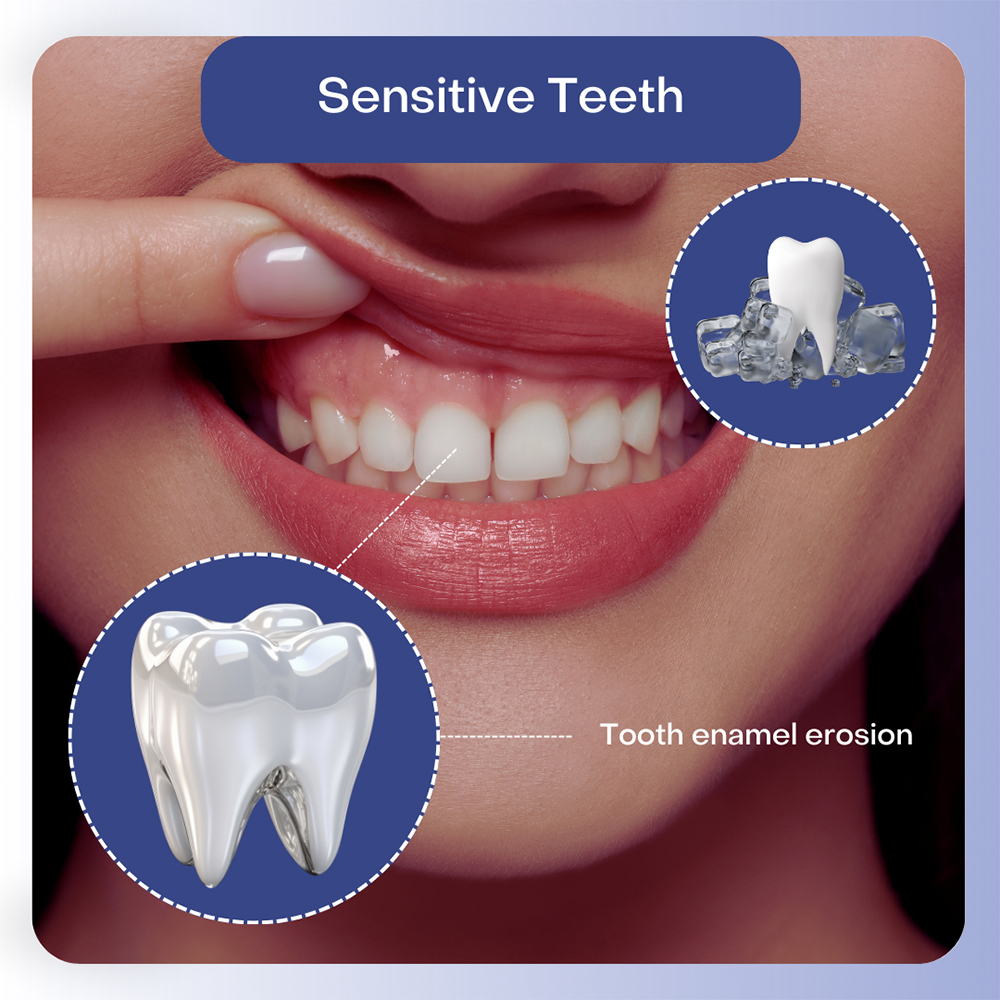Table of contents
We see many people with tooth sensitivity problems, and we can help you understand why your teeth may feel more sensitive than others. We can discuss available treatments for sensitive teeth and how to manage dental hypersensitivity.
 Often, people with sensitive teeth have issues with their tooth enamel, the hard outer coating that helps protect teeth. When enamel is damaged, the dentin underneath is exposed. Dentin consists of tiny, tightly packed hollow tubes, and sensations can penetrate the dentin, reaching the nerve in the center of your tooth. There are various ways tooth enamel can be damaged, including:
Often, people with sensitive teeth have issues with their tooth enamel, the hard outer coating that helps protect teeth. When enamel is damaged, the dentin underneath is exposed. Dentin consists of tiny, tightly packed hollow tubes, and sensations can penetrate the dentin, reaching the nerve in the center of your tooth. There are various ways tooth enamel can be damaged, including:
When you see our dentist in New Jersey for tooth sensitivity, we will ask you about the pain and if you can describe it. For example, some people experience continuous pain; for others, it is more of a sharp or stabbing sensation or a throbbing pain. We will also ask if anything triggers the sensations and how long they last. Before your visit, it can be worth noting when you experience tooth sensitivity and its intensity.
We will review your oral health habits and medical history to identify potential risk factors and conduct a dental examination. After completing our exam, we can discuss our findings and suitable treatments.
Various treatments can help reduce tooth sensitivity by preventing sensations from penetrating your dentin and reaching your tooth nerve.
Fluoride is one possible treatment for sensitive teeth. It can be applied as a varnish or as a gel. Sometimes, we may massage it into the teeth to enhance the effect.
If tooth enamel is significantly damaged or if tooth roots have become exposed due to severe tooth decay, we may suggest replacing a filling to protect these areas.
If we suspect the tooth nerve is inflamed or you experience intense tooth nerve pain, we may recommend root canal therapy as a dental hypersensitivity treatment. Removing the tooth nerve eliminates the source of dental pain and sensitivity. Afterward, we can restore the tooth so it feels more comfortable.
If you have bruxism, we will want to treat this dental problem, usually with a custom-made mouthguard or night splint. Bruxism tends to be a nocturnal habit, so you must wear your mouthguard each night.
We can also advise you on caring for your teeth at home so they feel less sensitive.
Home treatments for sensitive teeth may include using toothpaste specially formulated for this problem. The toothpaste blocks the tubes in the dentin, reducing sensations that can reach the tooth nerve. It needs to be used for several weeks to become truly effective, and you will need to continue using it to maintain the results.
We may supply you with a desensitizing paste, a fluoride paste that you apply to your teeth at home.
Our dentist can review your diet with you, helping you to make healthier choices that can trigger tooth sensitivity. Foods that are best avoided include anything acidic, sticky, or high in sugars.
Better choices include fruits and vegetables that are rich in fiber, cheese, which is packed with protein and calcium that helps harden tooth enamel, and other dairy products like plain yogurt and milk. These foods will help keep your mouth moist, as saliva helps fight acids and bacteria that can erode tooth enamel.
When brushing your teeth, don’t brush too hard as you could damage your tooth enamel. Use a soft-bristled toothbrush and small circular movements holding your brush at a 45° angle to your gums. Wait at least half an hour after eating before brushing your teeth.
Tooth whitening products, particularly those you can buy over-the-counter or online, can easily cause tooth sensitivity, especially if you overuse them. If you have been whitening your teeth, we advise you to take a break. Ideally, if you wish to whiten your teeth, talk to us about how to do it professionally. Professional whitening treatments are safer, and we can manage unwanted symptoms like sensitive teeth.
If you suffer from acid reflux disease or have problems where you vomit frequently, see your healthcare provider for advice on managing these conditions. When teeth are continually exposed to strong stomach acid, they can easily become damaged. We can help you to protect your tooth enamel while you get these issues under control.
Tooth sensitivity is common, but please don’t suffer in silence. It is important to get a proper diagnosis just in case it is due to a more serious issue. We can provide suitable treatment to protect your teeth from further damage so they feel comfortable and pain-free.

My name is Victoria Kushensky. I am a general dentist dedicated to remaining at the forefront of my field. Combining compassionate care with extensive knowledge, I offer cosmetic and general dentistry services as well as advanced root canal treatments.
I earned my Doctor of Dental Surgery (DDS) degree from the esteemed New York University College of Dentistry. Throughout my career, I have honed my skills in various dental procedures, ensuring effective treatment for each patient’s unique needs. I prioritize patient comfort and understanding, taking the time to thoroughly explain procedures and address any questions.
More about Dr. KushenskyMy NJ Dentist: Victoria Kushensky, DDS
385 Prospect Ave Suite 304
Hackensack, NJ 07601
(201) 298-8000